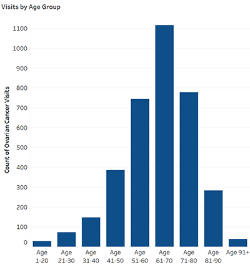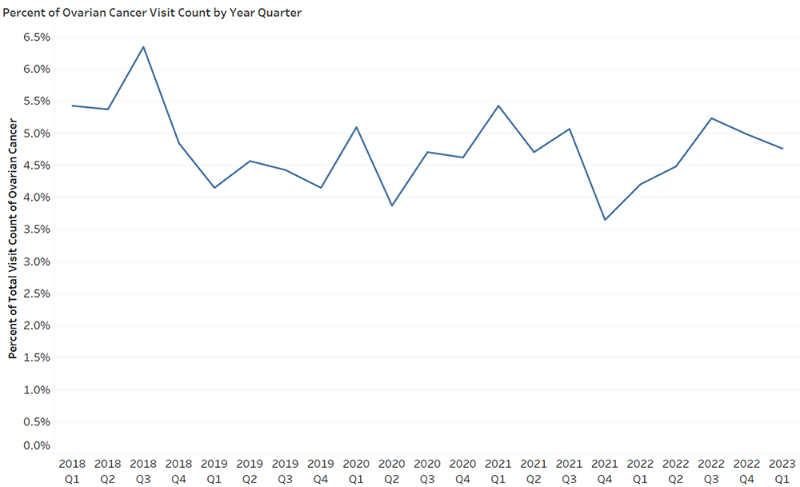Vol. 67, Issue 36
View more issues of The Valued Voice
Sign Up for WHA's Newsletter
Click here to view past issues
IN THIS ISSUE
- ProPublica Highlights Labyrinthian Complexity in Appealing Health Insurer Denials
- Last Chance to Register for WHA Workforce Forum, Sept. 13 in Madison
- Community Benefit Stories for 2023 Report Due Tomorrow
- CMS Proposes Minimum Staffing in Nursing Homes
- Fast Facts from the WHA Information Center: September is Ovarian Cancer Awareness Month
EDUCATION EVENTS
Feb. 25, 2026
2026 Advocacy DayMar. 4, 2026
Spring 2026 Annual Survey TrainingMar. 5, 2026
Operational Vacancy: An Effective Tool for Workforce PlanningClick here to view education event calendar
View more issues of The Valued Voice
Sign Up for WHA's Newsletter
Thursday, September 7, 2023
 In the United States, September is known as Ovarian Cancer Awareness Month. According to the American
In the United States, September is known as Ovarian Cancer Awareness Month. According to the American Cancer Society, more than 19,000 women are estimated to be diagnosed with ovarian cancer in 2023. Ovarian cancer is the fifth leading cause of death among women and mainly develops in older women. Almost 14,000 women will die from ovarian cancer in 2023. The incidence rate of ovarian cancer has slowly been declining since the early 2000s, which could be due partly to the increased use of oral contraceptives.
Cancer Society, more than 19,000 women are estimated to be diagnosed with ovarian cancer in 2023. Ovarian cancer is the fifth leading cause of death among women and mainly develops in older women. Almost 14,000 women will die from ovarian cancer in 2023. The incidence rate of ovarian cancer has slowly been declining since the early 2000s, which could be due partly to the increased use of oral contraceptives.
 The WHA Information Center analyzed visits related to ovarian cancer from Wisconsin hospitals in the past few years. The average age of patients visiting for ovarian cancer is 63 years, which follows the national trend of older women being more likely to develop the cancer. The age group with the highest visit count is ages 61-70, followed by ages 71-80. The timeline analyzing counts from the previous year indicates a decreasing number of visits.
The WHA Information Center analyzed visits related to ovarian cancer from Wisconsin hospitals in the past few years. The average age of patients visiting for ovarian cancer is 63 years, which follows the national trend of older women being more likely to develop the cancer. The age group with the highest visit count is ages 61-70, followed by ages 71-80. The timeline analyzing counts from the previous year indicates a decreasing number of visits.
Risk factors for ovarian cancer from the American Cancer Society include:

Fast Facts from the WHA Information Center: September is Ovarian Cancer Awareness Month
 In the United States, September is known as Ovarian Cancer Awareness Month. According to the American
In the United States, September is known as Ovarian Cancer Awareness Month. According to the American Cancer Society, more than 19,000 women are estimated to be diagnosed with ovarian cancer in 2023. Ovarian cancer is the fifth leading cause of death among women and mainly develops in older women. Almost 14,000 women will die from ovarian cancer in 2023. The incidence rate of ovarian cancer has slowly been declining since the early 2000s, which could be due partly to the increased use of oral contraceptives.
Cancer Society, more than 19,000 women are estimated to be diagnosed with ovarian cancer in 2023. Ovarian cancer is the fifth leading cause of death among women and mainly develops in older women. Almost 14,000 women will die from ovarian cancer in 2023. The incidence rate of ovarian cancer has slowly been declining since the early 2000s, which could be due partly to the increased use of oral contraceptives.Risk factors for ovarian cancer from the American Cancer Society include:
- Aging: Most ovarian cancers develop after menopause. Half of all ovarian cancers are found in women 63 years of age or older.
- Being overweight or obese: Obese women (those with a body mass index [BMI] of at least 30) probably have a higher risk of developing ovarian cancer, but not necessarily the most aggressive types, such as high-grade serous cancers.
- Having a family history of ovarian cancer, breast cancer, or colorectal cancer
- Having children later or not having a full-term pregnancy: Women who have their first full-term pregnancy after age 35 or who never carried a pregnancy to term have a higher risk of ovarian cancer.

Vol. 67, Issue 36
Thursday, September 7, 2023
Fast Facts from the WHA Information Center: September is Ovarian Cancer Awareness Month
 In the United States, September is known as Ovarian Cancer Awareness Month. According to the American
In the United States, September is known as Ovarian Cancer Awareness Month. According to the American Cancer Society, more than 19,000 women are estimated to be diagnosed with ovarian cancer in 2023. Ovarian cancer is the fifth leading cause of death among women and mainly develops in older women. Almost 14,000 women will die from ovarian cancer in 2023. The incidence rate of ovarian cancer has slowly been declining since the early 2000s, which could be due partly to the increased use of oral contraceptives.
Cancer Society, more than 19,000 women are estimated to be diagnosed with ovarian cancer in 2023. Ovarian cancer is the fifth leading cause of death among women and mainly develops in older women. Almost 14,000 women will die from ovarian cancer in 2023. The incidence rate of ovarian cancer has slowly been declining since the early 2000s, which could be due partly to the increased use of oral contraceptives.Risk factors for ovarian cancer from the American Cancer Society include:
- Aging: Most ovarian cancers develop after menopause. Half of all ovarian cancers are found in women 63 years of age or older.
- Being overweight or obese: Obese women (those with a body mass index [BMI] of at least 30) probably have a higher risk of developing ovarian cancer, but not necessarily the most aggressive types, such as high-grade serous cancers.
- Having a family history of ovarian cancer, breast cancer, or colorectal cancer
- Having children later or not having a full-term pregnancy: Women who have their first full-term pregnancy after age 35 or who never carried a pregnancy to term have a higher risk of ovarian cancer.

IN THIS ISSUE
- ProPublica Highlights Labyrinthian Complexity in Appealing Health Insurer Denials
- Last Chance to Register for WHA Workforce Forum, Sept. 13 in Madison
- Community Benefit Stories for 2023 Report Due Tomorrow
- CMS Proposes Minimum Staffing in Nursing Homes
- Fast Facts from the WHA Information Center: September is Ovarian Cancer Awareness Month

